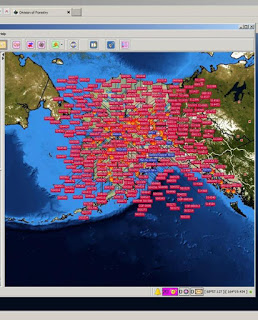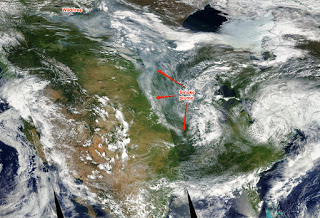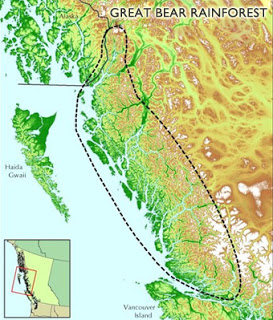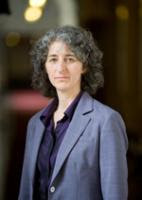SUMMARY: The coming unstable tropics, seen through an ancient world. From the UK, Dr. Jessica Whiteside. Former NASA scientist James Hansen says 2 degrees warming is unsafe and “crazy” to set that as a goal. Huge Canadian rainforest on cusp of mega-deal to save it. Activist Valerie Langer. Radio Ecoshock 150701.
I begin with the voice of James Hansen, one of the world’s most respected climate scientists. He spoke recently on Radio National in
Australia. I have more on this mega-warning of the developing climate emergency later in this blog entry.
We’ll also investigate a Canadian deal to preserve ancient old-growth forests in an area the size of Ireland. Is The Great Bear Rainforest agreement a model for the rest of the world? Our guest is long-time campaigner Valerie Langer from Vancouver, Canada.
But first, let’s bust the myth that the tropics won’t change much as the climate rearranges. Businessmen and government leaders keep
rattling on about our future with 1000 parts per million or more of carbon dioxide. New science explains that even big dinosaurs couldn’t live in that kind of world, ravaged by swings of climate so huge that plant life was unstable and unpredictable in the tropics.
Welcome to Radio Ecoshock. I’m Alex Smith.
Download or listen to this program in CD Quality or Lo-Fi.
Or listen right now on Soundcloud!
BREAKING NEWS: July 1st: MASSIVE FIRES ACROSS WESTERN NORTH AMERICA, from California to Alaska, and all Canadian western provinces.
The Western half of North America is breaking into massive fires. In Alaska, over a million acres have been burned in just the month of June. The real fire season is yet to start.
Fires in the Canadian province of Saskatchewan are so large, satellite pictures show smoke blowing all the way down through the central United States, as far south as Missouri. Air quality is hazardous in some cities in Saskatchewan and nearby Manitoba. There are, at last count, over 200 large wildfires burning in the Canadian provinces of Alberta and Saskatchewan, including some near Fort McMurray, home to the infamous Tar Sands.
The coastal Province of British Columbia has major wildfire problems, already burning ten times what was consumed by fire all of last year – again with the hot summer still to go.
Major wildfires are also burning in Washington State and Oregon.
Nobody is even reporting on the monster fires in the Canadian Arctic. Some parts of Siberia were up to 6 degrees C hotter than normal this Spring. Deadly fires are already common there. At what point do we acknowledge that great parts of the Northern Hemisphere will burn, releasing all that carbon, every year as climate change develops?
Stay tuned next week for a replay of our in-depth program on fire risk: “The Age of Super Fires”.
ECOSHOCK NEWS
My climate action song “Time of Trials” has been selected this week by the United Nations Framework Convention on Climate Change
(UNFCCC) in their on-going series of climate inspiration music leading up to the 2015 Paris climate talks in December.
You can find their write up in Spanish here. And here is the announcement in English.
You can listen to “Time of Trials” right now on Soundcloud here.
COMING TROUBLE IN THE TROPICS: JESSICA WHITESIDE
Businessmen and gloomy scientists have predicted our fossil-powered lives mean carbon dioxide levels in the atmosphere will reach
1,000 parts per million or more. What would such a world look like? We can get a glimpse by going way back, hundreds of millions of
years, to a troubled hothouse world.
Our tour guide will be Dr. Jessica Whiteside, a lecturer in Ocean and Earth Science at the University of Southampton in the UK. She’s the lead author of a new study that’s been getting a lot of press. The title is “Extreme ecosystem instability supressed tropical dinosaur dominance for 30 million years.” – as published in the Proceedings of the National Academy of Sciences.
One of the strange things about “land” is that it actually floats around on the Earth’s hot core. A group of scientists travelled to New Mexico, where they found rocks that were much earlier in the tropics. There was no North America, or Europe – just one big continent on the earth, known as “Pangea“.
Scientists investigating the history of dinosaurs were always puzzled when no bones of the giant herbivores (picture a Brontesauraus) were found in rocks formerly in the tropics. What kept them out for around 30 million years?
Now, through a series of methods cross-checking one another, this new paper suggests the climate of the tropics was far too unstable to grow the vegetation necessary to support very big herbivore dinosaurs. Over millions of years, the tropical climate swung violently from huge droughts to very wet periods. The vegetation would build up during wet times, and then burn with very hot wild fires during dry times.
The scientists found carbon deposits from fires that burned at around 600 degrees – enough to sterilize the soil. Nothing grew back
afterwards for a long time. I noticed with special interest the very hot fires that burned in that ancient tropical world. A Canadian fire expert on Radio Ecoshock told us about fires current fires so hot they sterilize the soil. More on that next week.
At that time the carbon dioxide levels in the atmosphere were 4 to 6 times modern levels, running from 1200 to 1600 parts per million CO2. Our guest Jessica Whiteside notes that is the expected level, on our current course, in the next one or two hundred years.
This extreme instability was stronger in the interior of the continent of Pangea, away from oceans that might modify conditions. That’s very much like what is expected in the interior of North and South America, as well as the interior of Russia and China.
I asked Jessica if humans could have survived in the conditions of these ancient tropics. She says that is doubtful, because the average temperature was ten degrees C higher than today.
We also discuss the lag time between higher CO2, and large climate changes. More conservative scientific thinking attributes “only” a 1 degree C rise for every doubling of CO2. But this is contradicted by studies of ancient climates (paleo-climatology) which saw 3 or even 5 degrees C of average temperature rise with each doubling of CO2.
The scientists doing this study were well aware that the high carbon past they looked at might serve as an analog, almost a prediction, of what we will experience with a lot more carbon dioxide in the atmosphere.
Download or listen to this Radio Ecoshock interview with Dr. Jessica Whiteside in CD Quality of Lo-Fi
JAMES HANSEN: 2 DEGREES IS NOT A GOAL – IT’S “CRAZY”
Let’s get to that disturbing new interview with James Hansen. He’s the former head of the NASA Goddard Institute for Space Studies.
He’s also the scientist who warned the U.S. Congress about the dangers of climate change in 1988. If only we’d listened then.
On Tuesday May 5th, 2015, Hansen was interviewed for the Australian breakfast show on ABC Radio National. Here’s what happened.
ABC RADIO NATION INTERVIEW WITH HANSEN
Here is the key passage:
HANSEN: “I refused to sign the Vatican Declaration which had the 2 degree limit and the reason I do not sign that is that the 2 degrees is actually a prescription for disaster. That’s actually well understood by the scientific community.
We know that the prior interglacial period about 120,000 years ago – it’s called the Eemian in Europe –but it was less than 2 degrees C warmer than pre-industrial conditions and sea level was a least 6 to 8 metres higher, so it’s crazy to think that 2 degrees Celsius is safe limit.
The only thing you can argue is that, well, it might take a while for the sea level to rise that much, but we know that it would happen because once the fossil fuels are burned to reach that level they are not taken out of the systems for millennia, and it does not require millennia for the ice sheets to disintegrate.
RN: If you say it would be crazy to shoot for two degrees but that is exactly what we are going to be shooting for in Paris at the global climate talks
HANSEN: That number (2 degrees) was chosen because it was convenient and thought that well that will give us a few decades so we can
set targets for the middle of the century.
Actually what the science tells us is we have an emergency, this is actually a global crisis and the science for that is crystal clear. It’s not obvious to the public because the climate system responds slowly, the ocean is 4 kilometres deep, these ice sheets are 3 kilometres thick. They only respond over time scales of decades to centuries, but once the processes are started it’s going to be extremely difficult if not impossible to stop them.
So what the science actually tells us is that we should reduce emissions as fast as practical, bearing in mind the economic consequences, but in fact the actions that are necessary are not economically harmful. You just have to make the prices of fossil fuels honest.“
FULL TRANSCRIPT HERE.
Note that James Hansen, just in the last few years, believes we need more nuclear power to stop climate change. The Australian
pediatrician and activist Helen Caldicott pretty well demolished that argument in her book “Nuclear Power Is Not the Answer to Global
Warming or Anything Else.” If Helen missed anything, it was shouted out to the world by the triple melt-down of three reactors at Fukushima Japan in 2011. If you want to bet on nuclear power, you are gambling with terrible stakes for the present and the future, in my opinion.
That said, James Hansen is one of the world’s greatest heroes of the science of climate change. Now he’s saying that on our present
course, within 40 or 50 years, the seas will rise several meters, demolishing the capacity of many of the world’s great cities along the ocean. I hope New York, London, Shanghai and all the rest are listening. Hansen also says it is not too late, even yet, to prevent that kind of disastrous outcome.
THE GREAT BEAR RAINFOREST: SEALING THE DEAL
There are not many truly wild places left in this world. Environmental activists have been fighting to save one of them for 18 years. It’s known globally as The Great Bear Rainforest.
Situated on the central and northern west coast of Canada, this rainforest is home to giant trees, some thousands of years old. In
countless coastal inlets, a rich mix of plants and animals thrive, including the iconic white bear, the Kermode or spirit bear.
Supposed enemies met to find a solution. Dedicated green activists including Greenpeace, Forest Ethics and the Sierra Club met in
marathon negotiations with executives of giant forest companies, First nations leaders and stakeholders preserve this great legacy.
Eventually the government of British Columbia made a promise. Now, almost a generation later, that government is within 60 days of
sealing the deal – a model of multi-party efforts to conserve nature that has inspired hope, around the world.
To help us understand what’s at stake, we have reached one of the long-term campaigners to save the Great Bear Rainforest, Valerie
Langer. She’s the Director of BC Forest Campaigns, for ForestEthics Solutions, and works for the convervation and markets group called “Canopy” as well.
Valerie Langer
Here’s the thing: the Great Bear Rainforest is an area the size of Ireland – much of it untouched by modern civilization. Canadian and American-owned logging companies wanted to log the whole thing. They had to be stopped.
Why would big forest companies give up some of the most valuable timber in the world, just to accommodate a few environmentalists?
Because of activism from all three groups making this rainforest wood untouchable in the market place. Hundreds of millions of dollars worth of contracts were cancelled. Companies like Home Depot swore they would never buy the wood from the Great Bear. Other
companies pulled out of British Columbia altogether.
Feeling the heat, the forest company executives agreed to something they had never considered before: meeting with the
environmentalists to make a deal. Some major foundations kicked in money to keep the negotiations going.
One of the major problems was to keep the Great Bear without leaving First Nations (aboriginal) communities in poverty, without even
logging jobs. Private foundations and donors raised $60 million dollars, matched by $30 million each from the Federal and Provincial
governments, to help the First Nations communities create their own alternative economy. Eco-tourism was just a part of that big picture.
All this had never been done before. It took 18 years to get it this far: the next 60 days are the final period for public comment, before the Great Bear deal is made into law.
The fight isn’t completely won yet. There is a rogue company logging in the Great Bear at a furious rate, trying to get as much as possible before the government gives final approval. It’s called Timber West. The Province of British Columbia needs to rein them in, but the province has laid off most of it’s enforcement staff. Public pressure on Timber West is still needed.
Still, a deal involving all parties, settled peacefully with dialog, stands as a model for other endangered forests all over the world. Valerie Langer is a powerful speaker and power-house campaigner, so give this interview a listen.
Download or listen to this interview with Valerie Langer in CD Quality of Lo-Fi
STUNNING COURT VICTORY IN THE NETHERLANDS
I can’t wrap up this show, and this season, without a few words about a stunning court victory in the Netherlands. Regular listener and green radio journalist Mark Beekhuis brought this to my attention. Mark writes, quote:
“This week a climate campaign group won a case against The Netherlands. A judge ordered the government to reduce carbon emissions
by 20% relative to 1990 – by the year 2020. This is a first in the world. The main legal argument is that the State should protect all of its citizens – also the ones not yet born.”
Imagine, a government must protect future citizens, our grandchildren and descendants! In their ruling, the judges said:
“The state should not hide behind the argument that the solution to the global climate problem does not depend solely on Dutch
efforts,”…”Any reduction of emissions contributes to the prevention of dangerous climate change and as a developed country the
Netherlands should take the lead in this.”
The current Dutch government is a coalition, where Beekhuis tells us, one party appears to accept this ruling, while another hopes to
overturn it.
The Dutch environmental group “Urgenda” has put all it’s legal documents on the Internet. They have been translated into English as well. The group wants other countries to follow their lead in the courts. Activists in Belgium have already done it, and groups in Norway are working on it. This could be a world-wide movment to force governments to do their job protecting the future for all to come.
Here is a link to a story on American National Public Radio about this case, so you can listen in to that. The Guardian write up is
here.
COMING UP THIS SUMMER
This program concludes the first half of my 2015 season. I’m hard at work collecting some of the most powerful interviews for a “best of Radio Ecoshock” series. Since we have not resolved or really responded to the climate threat, the science and the activism going back several years is still very valid today. I hope you’ll keep listening through the summer, as we go deep into the issues we all face, with a wide variety of voices.
At the end of the summer, in the Northern Hemisphere, I’ll return with a whole new energy, and a whole new series of programs.
Of course that’s assuming I can keep quiet even for a little while. Right now it’s 107 degrees, about 42 degrees Celsius, in any shade you can find, outside my studio walls. That’s in Canada, with summer barely started. Scratch, that, its gone up to 111 degrees F in the shade, 44 degrees C!!! This is insane!
It’s not just here in Western North America. As Jeff Masters writes in his blog, there are record temperatures being set on four continents this June/July. Record heat in Britain, Spain, Pakistan, India, Turkmenistan – the list is long.
We may have to begin with replays of our powerful interviews with top fire experts. There’s lots more to come on Radio Ecoshock, so
please say tuned.
I’m also working on more new climate music to help spark the Paris climate talks. Watch the Radio Ecoshock page on Soundcloud for
that.
I’m Alex Smith. Thank you for listening, and thank you for caring about your world.





How The 2°C Will Cause Starvation And Deforestation
===================================================
We only have about 10% of our earth's original forests left. We destroy more than 20 million acres of forest every year. We already slashed and burned half the rainforests on earth. Rainforest soil is of poor quality and quantity so farming it only degrades it even faster. Rainforest roots are so dense, they don't require robust and plentiful soils. But, why is this so important to how fast collapse will be? The answer lies straight ahead.
In 2007, the IPCC told us emissions must peak by 2015 to stay within 2 °C of warming.
In 2014, the IPCC told us emissions must peak by 2030 to stay within 2 °C of warming.
The IPCC says we can make this change because of what they call "negative-emissions bio-energy". meaning we will get energy by consuming plant matter so it pulls more CO2 out of the air than it emits; for which, by the way, no such technology exists, and the kicker is, they say, that we will need 1.5 billion acres of NEW farmland to do it. That much farmland is about the size of India, which is equal to nearly 50% of all the arable land on earth.
The acronym for this fantasy is BECCS (Bio-Energy Carbon Capture & Storage). The real acronym is BS (Bull Shit). Where do you think we'll find all this new farmland? The rainforests. World hunger will guarantee it. Why? Read on.
In 60 years, human agriculture will ground to a stop because of soil loss and degradation. 20% of China's soil and 50% of its groundwater is already unsafe. We are right now already slashing and burning Brazil's rainforests just to feed China's pigs. China's pigs already eat 50% of the soy grown in South America. The Chinese are buying up farmland all over the earth.
We will need 12 million acres of brand new farmland EVERY year for 30 years to feed that many people all their lives. Instead, we are losing 24 million acres of farmland EVERY year. We are losing soil at twice the rate we need to grow it just to be able to eat, never mind the additional requirements of BECCS.
We will soon run out of easy access to 2 critical fertilizers which are irreplaceable, cannot be manufactured by humans and for which there are no substitutes.
In 10 years 4 billion people will be without enough water.
In 10 years 2 billion people will be severely short of water.
Ground water depletion has gone critical in major agricultural centers worldwide.
SourcesL https://www.reddit.com/r/collapse/comments/3biw92/how_fast_will_collapse_be/